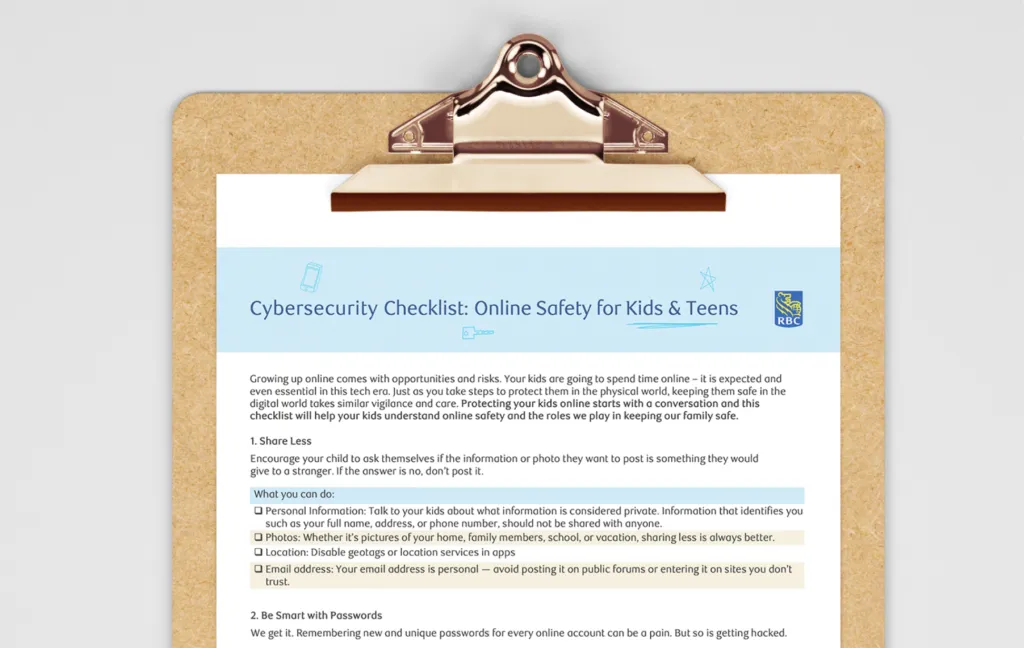Published August 10, 2018 • 6 Min Read
No matter what stage of life you’re at, most people don’t enjoy spending their time thinking about budgets.
But finding ways to take control of your financial life doesn’t have to cause you stress. Here are some simple ways to help you start taking charge of your budget at any age with insights from Sarah Baeumler of HGTV Canada’s Home To Win and Bryan Inc.
Mid to Late Teens
You’re not yet an adult, but you’re starting to think about your future which might involve going to college or university, and moving out. Those are expensive things and you’re likely wondering how you’ll pay for them. Being smart about money now will help.
1. Join the working world
The most influential part of a budget is income. Getting a job in your mid or late teens can help you start earning cash and getting work experience.
2. Be responsible with your own money
“When I was in high school my parents encouraged me to budget,” says Sarah. “They taught me to separate my babysitting money so that half went into my savings account and half went to buy items that I may have wanted, or to help pay for outings with my friends and family. Now, I help my kids with budgeting by helping them manage their own debit accounts so that they can learn to save and spend wisely the money they’ve made from chores.”
As a teen you may have some chore money saved up in your bank account and you’re learning how to budget your money and spend responsibly. But when you do want to spend it on something special, you usually have to beg your parents to let you use their credit card if you want to pay online. The good news is that you can get a debit card to pay online beginning at the age of 14. By using the money directly from your bank account you can manage your money and stick to your budget, without having to borrow your mom’s credit card.
Twenties
Whether you’re still in school or starting to establish yourself in the working world, one thing that may be universal about life in your twenties is that money is tight.
1. Manage funds like a pro
“When I first moved out on my own it was a struggle to balance my finances and manage all of my monthly bills,” says Sarah. “Like most people in their late teens and early twenties, I lived off of macaroni and cheese until I learned how to better manage my budget. It was a great feeling once I found a balance with my money.”
Want to buy concert tickets for your favourite band, but you’re not sure how many bills you still have to pay for this month? You may want try an app that keeps an eye out and ensures you’re on the right financial track. Get an app that will provide you with timely and personalized spend trends based on your money-while you’re out living your busy life.
2. Establish credit
Your twenties can be a great time to start building a good credit score. That means getting a credit card, line of credit, or loan, and making all your payments on time. Building a good credit score may help you later in life, such as getting a lower interest rate if you take out a mortgage.
Thirties
You might be making a little more money now that you’re more established in your career, but you may also have more expenses.
1. Put an end to grey charges
What’s a grey charge? It’s a monthly or annual subscription that you signed up for years ago and forgot about and yet it is still being charged to your account, like an old gym membership for example. Take a look through your statement and see if you have any grey charges and cancel them.
Lifestyle inflation is real. When more money starts rolling in the door, you suddenly start thinking about all the things you’ve had on your ‘To Buy’ list for years.
2. Save your bonuses and pay increases
When more money starts coming in, many people suddenly start thinking about all the things on their ‘To Buy’ list. But before you turn your bonus into a shopping spree, consider making a commitment to use pay increases and bonuses to supercharge your retirement savings. The more you save now, the longer it has to grow.
Forties and Fifties
Your forties and fifties are the time when many people hit a stride in their careers. It’s also a time when you might be worrying more about retirement and want to get a tighter grip on your budget.
1. Check your budget
“My best tip for budgeting now is to be sure to check in on your budget regularly and adjust as needed,” says Sarah. “I am constantly managing my money on the go. I use my phone on a daily basis to check my bank account balances, pay bills, and ensure money is being saved.”
2. Focus on the big things
Spend your energy by doing things that will result in big savings like negotiating a better cell phone or internet contract or refinancing debt at a lower interest rate. Although still beneficial, clipping coupons to save 50 cents on yogurt may not be as impactful on your budget in the long run.
3. Save aggressively
As you get closer to retirement, now can be the time to increase the amount you’re saving so that it still has time to grow before you retire. Consider taking a few staycations rather than going on expensive trips, or wait a little longer to replace your old car.
Sixties and Beyond
Retirement might be the best time of your life, but it can also be a stressful time if you’re on a limited income. Luckily, there are still some things you can do to protect your budget.
1. Reduce expenses
You’re approaching your retirement and it’s time to test living like you’re retired. That doesn’t just mean taking up woodworking. You should reduce your budget to see if you can live on your retirement income. Take a look at your budget and start cutting what you might not need.
2. Get your discounts
One of the benefits of getting older is that companies start to offer you more discounts. Seniors can save on things like car insurance, tickets, or meals out. Pay attention to which businesses offer savings for seniors and take advantage of them to help maximize your budget.
Small Steps Add Up
While one budget tip alone may not have a big impact on your bottom line, they can add up.
“The more things you can do to work towards greater financial security now, the more you’ll benefit later on,” Sarah says. “You can start making better financial choices at any age and gain control of your money.”
This article is intended as general information only and is not to be relied upon as constituting legal, financial or other professional advice. A professional advisor should be consulted regarding your specific situation. Information presented is believed to be factual and up-to-date but we do not guarantee its accuracy and it should not be regarded as a complete analysis of the subjects discussed. All expressions of opinion reflect the judgment of the authors as of the date of publication and are subject to change. No endorsement of any third parties or their advice, opinions, information, products or services is expressly given or implied by Royal Bank of Canada or any of its affiliates.
Share This Article






